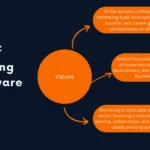
The days of professionals following straight paths to employment and moving up the corporate ladder gradually are long gone. Squiggly careers, which prioritize flexibility, adaptability, and ongoing learning over conventional professional advancement, are becoming more and more popular these days. Squiggly careers entail switching sectors, jobs, and skill sets over the course of one’s professional life rather than following a linear path from entry-level to senior positions inside a single organization.
This change is a reflection of the changing nature of the labor market, where countless opportunities have been made possible by remote employment, technology, and the gig economy. A squiggly career is about growth, curiosity, and creating a profession that fits with individual goals rather than social norms. It is not about instability.
What Are Squiggly Careers?
A non-linear, uncertain, and frequently non-traditional career path is known as a “squiggly career.” Squiggly careers are characterized by frequent changes, pivots, and diversions, in contrast to standard career pathways, which run in a straight line from entry-level jobs to higher positions within a single field.
These changes could be related to professions, industries, or even completely different professional paths. The word “squiggly” describes the zigzagging character of these professions, where advancement is determined by the accumulation of varied experiences, abilities, and viewpoints rather than by vertical advancement.
Globalization, changing workplace dynamics, and technological improvements represent a few of the causes contributing to the rise of squiggly careers. Career fluidity has become more commonplace due to the gig economy, remote work, and the growing need for transferable skills.
Furthermore, a lot of people are placing a higher value on work-life balance, personal fulfillment, and ongoing education than on more conventional indicators of success like job titles and pay raises. In this sense, a squiggly career reflects changing personal ideals and goals in addition to being a reaction to outside changes.
How to Embrace Squiggly Careers?
To succeed in a squiggly career, one must adopt a new perspective and be prepared to deviate from accepted career conventions.
Develop a Growth Mindset
Learning and developing are key components of a squiggly career. Instead of fearing change, view each career shift as an opportunity to expand your skill set and gain new experiences.
Build Transferable Skills
Having a strong set of transferable skills, like leadership, problem-solving, and communication, facilitates career transitions because squiggly careers require shifting between industries and roles. Skill building is another important part of having transferable skills. Our blog content about “Skill Building: How to Develop Your Skills” can be helpful.
Network and Seek Mentorship
Instead of using conventional job applications, opportunities in squiggly careers frequently arise through connections. Engaging with diverse professional networks and seeking mentorship can open doors to new possibilities.
Accept Unpredictability
Unlike traditional careers, squiggly careers do not follow a clear-cut path. It’s essential to get comfortable with uncertainty and trust that each experience contributes to your growth.
Align Work with Personal Values
The freedom to pursue work that reflects your values and passions is provided by squiggly careers. Before making career shifts, reflect on what truly matters to you and seek roles that support your vision.
What Are the Drawbacks of Squiggly Careers?
Squiggly careers present professionals with obstacles to overcome even though they provide flexibility and fulfillment.
Lack of Job Security
Unlike traditional careers that offer long-term stability, squiggly careers can sometimes lead to periods of unemployment or uncertainty. Freelancers and entrepreneurs, in particular, may experience fluctuating income.
Professional Identity Challenges
In traditional career paths, job titles define one’s expertise. In a squiggly career, constantly shifting roles can make it harder to establish a clear professional identity, which can be challenging when marketing oneself to potential employers or clients.
Difficulty in Career Planning
Long-term career planning can be more complex when following a squiggly career path. While traditional careers offer a predictable trajectory, these careers require individuals to navigate uncertainty and plan for unexpected shifts.
Need for Constant Learning
Squiggly careers require professionals to move between various industries and roles, so they need to constantly improve skills development to stay competitive. This requires dedication, time, and sometimes financial investment in education or certifications.


